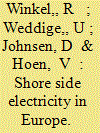|
|
|
Sort Order |
|
|
|
Items / Page
|
|
|
|
|
|
|
| Srl | Item |
| 1 |
ID:
093523


|
|
|
|
|
| Publication |
2010.
|
| Summary/Abstract |
We establish the link between energy use, air pollution, and public health impacts in Taiyuan for 2000, and for 2010 and 2015 under alternative scenarios. We find that in year 2000 more than 2200 excess deaths may have been caused by particulate matter (PM) pollution. Using alternative methods for monetization of health impacts the total health damage amounts to 0.8-1.7 billion Yuan, which is 2.4-4.9% of the city's GDP in 2000. Compared to the business-as-usual scenario, scenarios assuming extensive fuel switch in low-and-medium-stack pollution sources and extension of the district heating system could prevent 200-1100 PM10-related premature deaths in 2010 and substantially reduce population morbidity. The actual PM pollution in 2007 was lower than modeled in these two scenarios. We also find that if air quality in urban Taiyuan were to reach the Chinese National Grade II Standard in 2015, the number of premature deaths would still be around 1330 and the economic cost about 1-2% of the city's GDP in 2015. Our results imply that there are large health benefits to be gained by setting stricter standards for the future in China, and that targeting low-and-medium-stack source effectively reduces health damage.
|
|
|
|
|
|
|
|
|
|
|
|
|
|
|
|
| 2 |
ID:
166734


|
|
|
|
|
| Summary/Abstract |
Inability or insufficient access to modern forms of energy is an important issue in development, which makes the notion of energy poverty a widely discussed topic. A consensus has been reached that energy poverty has serious health, education, and other socio-economic impacts for people in a country. However, measurements of energy poverty have generally been absent or inaccurate, especially for developing countries at the micro level. This paper begins with the multidimensional nature of energy poverty and uses household-level survey data in China to construct a quantitative measure of energy poverty, covering both affordability of and accessibility to a broad range of forms of energy. It then builds an econometric model to address empirically how much energy poverty affects health. A statistically significant and robust negative impact on health from energy poverty is confirmed. Our results have important policy relevance in terms of understanding the current status quo of energy poverty in China and its consequences. The concept can also be expanded to investigate similar issues in other developing countries.
|
|
|
|
|
|
|
|
|
|
|
|
|
|
|
|
| 3 |
ID:
150344


|
|
|
|
|
| Summary/Abstract |
In the context of reducing emissions from the transport sector, the EU Commission envisions a strong modal shift to energy efficient modes including maritime shipping and inland shipping, as an alternative for road transport. In view of the expected growth of the sector, the emissions from waterborne transport are a key concern. When at berth, ships typically use their auxiliary engines to generate electrical power for communications, lighting, ventilation and other on-board equipment. The extended use of vessels’ auxiliary engines augments greenhouse gas (GHG) emissions and air pollution in the adjacent ports, which are typically located in or near densely populated areas, thus leading to dangerous health and environmental effects. Shore Side Electricity (SSE) is an option for reducing the unwanted environmental impacts of ships at berth, i.e. GHG emissions, other air pollutants (NOx, SOx, PM) and noise of ships using their auxiliary engines. This paper quantifies the economic and environmental potential for SSE in Europe, through detailed estimation of in-port ships’ emissions and relevant energy demand, providing an insight of the expected barriers for implementation and formulating recommendations on policy actions that could accelerate the implementation of SSE in European harbors.
|
|
|
|
|
|
|
|
|
|
|
|
|
|
|
|
|
|
|
|
|